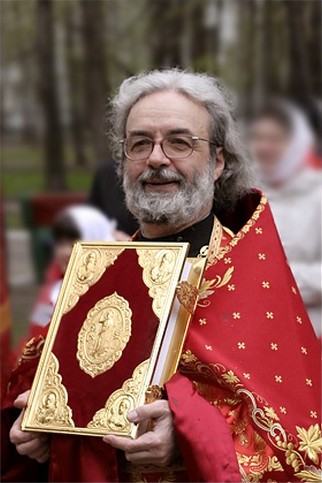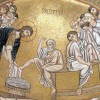A few weeks ago we invited our readers to submit questions about Great Lent to Archpriest Alexander Iliashenko, Rector of the Church of the All-Merciful Savior in Moscow and founder and director of Pravmir. We are pleased to offer below a selection of your questions along with Fr. Alexander’s replies.
Question: I often hear that fasting is not primarily about abstaining from certain foods, but more about abstaining from indulging the passions and engaging in sinful behavior. Yet church calendars give very specific instructions about what can and cannot be eaten and we are also often encouraged to observe these fasting rules. How, practically speaking, can we balance these two rather different sets of instructions? – Patrick.
 Fr. Alexander: Greetings, Patrick!
Fr. Alexander: Greetings, Patrick!
Yes, you’re absolutely right: fasting is primarily about abstaining from the passions, from sinful behavior, and even from certain thoughts that can be sinful. That’s what’s most important, because therein lies the actual purpose of fasting: to overcome our shortcomings. “Let us observe a fast acceptable and pleasing to the Lord. True fasting is to put away all evil, to control the tongue, to forbear from anger, to abstain from lust, slander, falsehood and perjury. If we renounce these things, then is our fasting true and acceptable to God” (Lenten Triodion). You see, abstinence from food isn’t even mentioned here. Nonetheless, abstaining from food is also very important: it involves obedience to the Church, self-denial, and training of the will. In addition, this kind of fasting is easy to monitor: you’re either fasting, or you’re not. Therefore church calendars include specific instructions about what one can and cannot eat, to facilitate our conscious adherence to these rules.
I wish you God’s help! I take this opportunity to congratulate you with the coming Feast of Christ’s Resurrection! Christ is Risen!
Question: I eat breakfast and dinner with family members who are not Orthodox, and have lunch at the cafeteria at work, where there is almost never anything fasting available. To be social with my friends and family, I often watch TV with them or go to the movies, even if I don’t really want to. I’m often so busy with my family and taking care of various domestic chores that I hardly have time for more than very basic prayers in the morning and evening. Given that I find it almost impossible to keep the fasts, to refrain from entertainments, or spend more time praying, how can I spend the Great Fast so that it would indeed be a fast? – Catherine.
Fr. Alexander: Greetings!
You ask how to spend the Great Fast so that it would indeed be a fast. That’s a very serious question and it’s very good that you’ve posed it. First of all, let’s reply to this question: what’s the purpose of fasting? The purpose of fasting is to overcome manifestations of sin, such as irritability, condemnation, cowardice, lack of faith, and so on. You write that it seems impossible for you to keep the fasts, to refrain from entertainments, or to spend more time in prayer. This is difficult, of course – but, I assure you, difficult isn’t the same as impossible. The Lord wants us to overcome certain of our weaknesses and passions. This means that if someone sincerely and ardently desires to fulfill God’s will, then he can indeed accomplish what might now seem impossible: keeping the fasts, refraining from entertainments, and spending more time in prayer.
Speaking of which, domestic chores are their own kind of fasting. It’s very important to perform one’s duties conscientiously and lovingly. It’s even more important than abstinence in food. But nowadays one can restrain oneself with regard to food as well: after all, even cafeterias offer vegetable or seafood dishes that are completely fasting. Even at home you can at least refrain from meat. And if you do the cooking yourself, you can make the usual foods for your family members and something fasting for yourself. During Holy Week try to fast a little more strictly, to go to church, to go to Confession, and to receive the Holy Mysteries of Christ.
The Lord is with you! I congratulate you on the upcoming Feast of Pascha! Christ is Risen!
Question: I find it very easy to keep the dietary part of the fast because there are so many products made out of soy: hot dogs, sausages, milk, ice cream, buffalo wings – everything! But I feel guilty about this, especially because these “fake” foods are so much more expensive than “real” food, so I have less money for helping others. What’s your advice about all these “fake” foods? – Alex.
Fr. Alexander: Greetings, Alex!
I think that your doubts about soy products are wholly justified. I think we can do without this “imitation” meat. Potatoes, beans, other vegetables, fruit, seafood, grains, chocolate, and dried fruit – these are all natural, fasting foods from which a wide variety of fasting dishes can be made. They’re probably cheaper than these “fake” foods. By switching to this naturally fasting diet, you’ll be able to fast more strictly and to help others more.
May the Lord help you in all your good deeds! I congratulate you with the upcoming Feast of Pascha! Christ is Risen!
Question: I heard that it was good to try to read the Bible more during Lent. But whenever I try reading the Gospels, I find that I’ve read it all so many times that I just can’t concentrate – I just can’t be surprised by it any more. When I try reading the Epistles, I find I just don’t understand anything. And when I try reading the Old Testament, I get scandalized by all the blood and sex. What’s the best way to read the Bible so that I can actually get something out of it? – Joel.
Fr. Alexander: Greetings, Joel!
Reading Holy Scripture is difficult. Understanding it properly and becoming imbued with its wisdom require a serious education and, moreover, a teacher or mentor who can explain things and offer advice. I’d advise you to find an Orthodox church and to get to know the priest, with whom you can regularly meet and discuss the questions that arise when you read the Bible. If there isn’t a priest near you, then write to me, and I’ll try to respond to your questions. I don’t think this is the best solution, because nothing can replace personal contact. But let’s hope that, in time, you’ll meet a spiritual guide.
May the Lord help you! I congratulate you on the upcoming Feast of Pascha! Christ is Risen!
Question: For many of my Catholic friends, Lent means primarily “giving something up.” This sounds like a nice idea, but I’ve always wondered what the Orthodox perspective is on this. After all, it seems like they give up some bad habit for a while, and then just pick it up again after Easter! What’s the best way to think about this? – Sarah.
Fr. Alexander: Greetings Sarah!
Yes, Sarah, it sometimes happens that people give up their sinful habits only for a time. Unfortunately, we cannot always uproot sin completely. But the effort that one puts into this battle doesn’t go to waste. The Greek word for repentance means “change of mind.” Even if we haven’t won the final victory, the Lord sees that we’ve battled with sin and rewards even the smallest effort. God’s mercy and the small experience that we’ve gained in this battle will help us to battle further and not to give up. Not growing despondent over setbacks, but trusting in God’s mercy and His all-powerful help, we should do battle with sin our entire life. Spiritual battle requires the desire to overcome sin, faith, persistence, prayer, and patience. But the result – that is, a change of soul for the better – will be granted by the Lord.
I congratulate you on the upcoming Feast of Pascha! Christ is Risen!
Question: I’ve heard some clergy advise giving up social media for Lent, and limiting Internet use in general. I like the idea, but it seems so impractical! As it is, most of my family, friends, and colleagues communicate only online! They get offended if I don’t reply to their messages or “like” their Facebook updates. I want to stay away from the Internet, but at the same time I don’t want to upset people by not being responsive. How can I find a happy medium? – James.
Fr. Alexander: Greetings, James!
The Apostle Paul, in his first epistle to the residents of Corinth, writes: All things are lawful unto me, but all things are not expedient: all things are lawful for me, but I will not be brought under the power of any (1 Corinthians 6:12). The Internet is a brilliant invention, without which our life seems impossible. But if often happens that people look at nothing except the Internet and become completely addicted to it, like being addicted to drugs. A system of self-restraint is essential precisely because we shouldn’t be brought under anything’s power. The system of traffic rules is a set of restrictions to ensure that traffic accidents be kept to a minimum. Therefore clergy advise limiting use of the Internet: to avoid addiction. It’s very good that you don’t want to upset anyone by not responding to their Facebook updates, but try to keep this kind of communication to a reasonable level, so that in the remaining days of the fast you’ll have more time to pray, to attend the services of Holy Week in church, and to receive the Holy Mysteries of Christ.
I congratulate you on the upcoming Feast of Pascha! Christ is Risen!
Question: During Lent I get completely obsessed with food! Every time I smell meat roasting or see a hot pizza, my mouth starts watering and my stomach starts growling. When I think of Pascha, all I can think about is all the non-fasting foods I’ll be able to indulge in. It seems that during Lent I think about food much more than outside of Lent. Doesn’t this defeat the whole point of fasting? Wouldn’t it be better to give in now and then just to stop obsessing? – Nick.
Fr. Alexander: Greetings!
I think that what you’re experiencing doesn’t nullify your fast. But if you were to give in, you still wouldn’t stop thinking about food – and then your fast really would be nullified. Fasting is difficult, but beneficial. Fasting tempers the will, strengthens faith, and brings joy to the heart. Don’t be discouraged! Ask the Lord in prayer for the strength to keep the fast, and have faith that your efforts won’t go unrewarded by the Merciful God.
I congratulate you on the upcoming Feast of Pascha! Christ is Risen!
Question: I try to spend extra time reading spiritual books during Lent, but they all seem to be written by and for monks! I find it really hard applying what I read to my own life. And even books not written for monks seem to assume an entirely different way of life than I see around me. I don’t live in nineteenth-century Russia or a Greek village! How can I find a way to apply what I read to my real life, here and now? – Tom.
Fr. Alexander: Greetings, Tom!
It’s indeed difficult to apply what one reads in the spiritual literature to one’s own life. The main difficulty is not just that it’s written by monks and for monks, but that – as with anything serious – it’s difficult to learn something on one’s own, without a teacher who could explain things and offer advice. I’d advise you to find a priest with whom you could regularly meet and discuss difficult questions. If there isn’t an Orthodox priest near you, then write to me, and I’ll try to respond to your questions. This isn’t the best solution, of course, because nothing can replace personal contact. But let’s hope that you’ll find a spiritual director – that’s very important, and I wish this for you with all my soul.
May the Lord help you! I congratulate you on the upcoming Feast of Pascha! Christ is Risen!
You might also like:
Archpriest Alexander Iliashenko, Ten Important Things To Do Before the End of Lent
Archpriest Andrei Efanov, The Fast: Ten Beneficial and Ten Harmful Things
Archpriest John Moses, Pastoral Advice for Holy Week




















